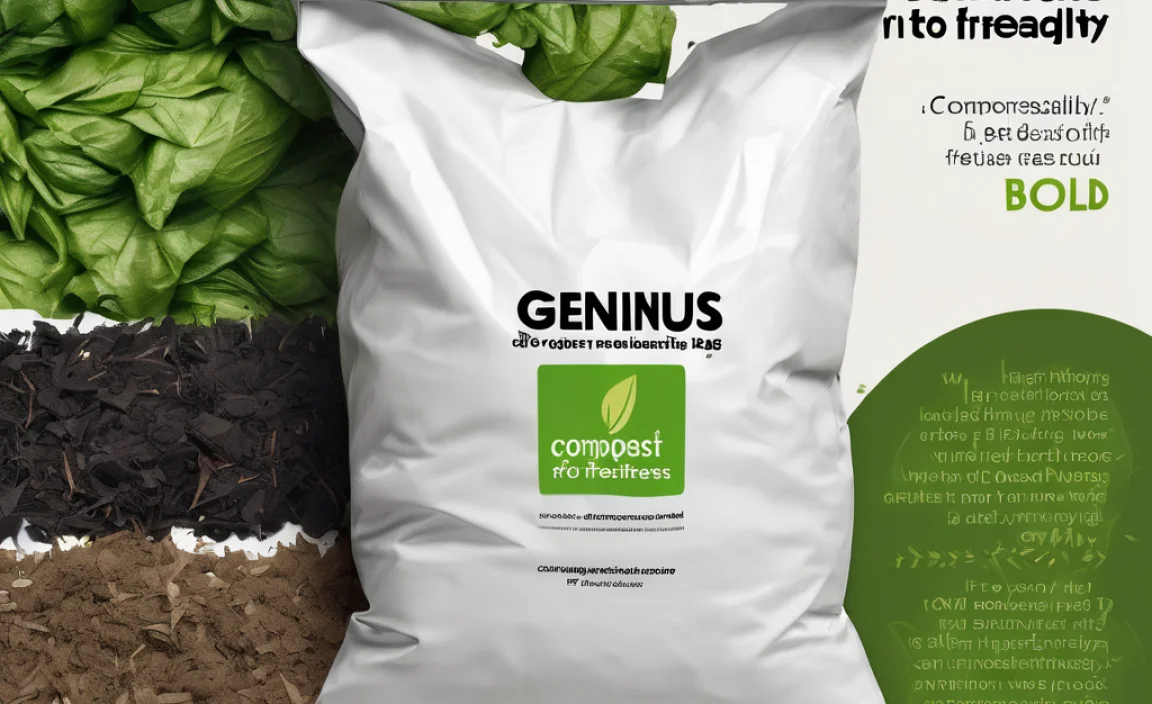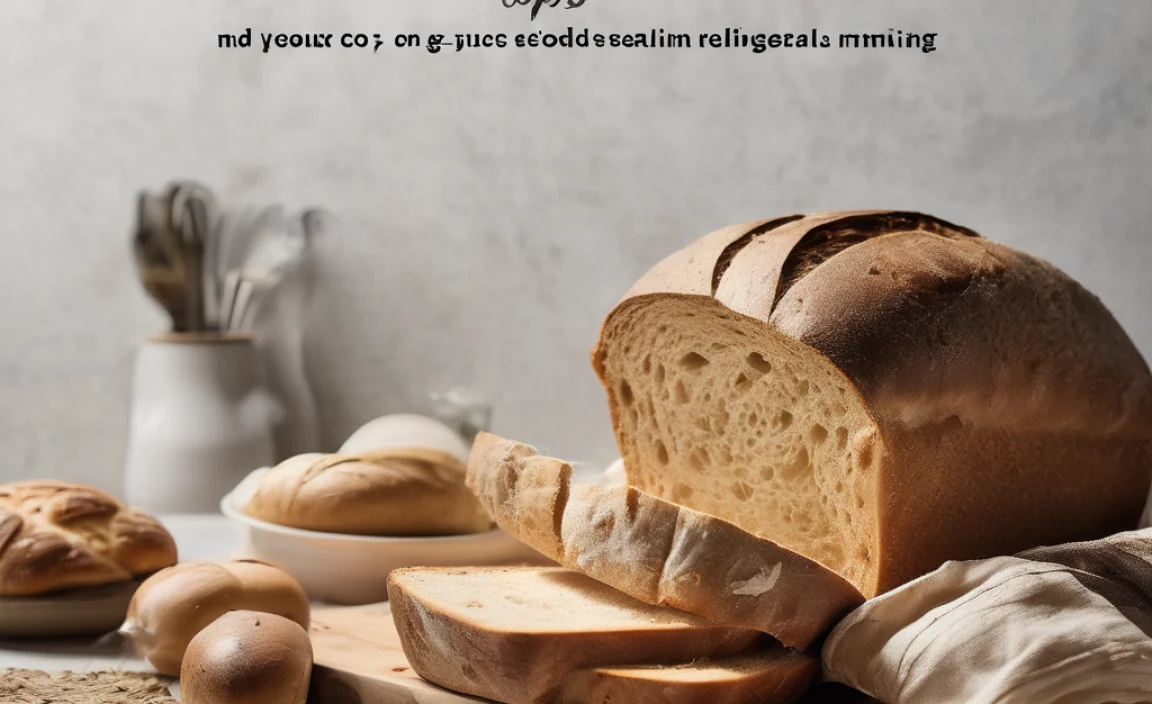Ever feel like your garden is missing something? You hear a lot about compost and biochar, and they sound similar, but what’s the real scoop? It can get a little confusing trying to figure out which one is best for your soil. Don’t worry! We’ll break down the compost vs biochar difference in a way that makes perfect sense. You’ll learn exactly what each one is, what it does, and how you can use them to give your plants the happiest home. Let’s dig in!
Compost vs Biochar Difference: Essential Knowledge for a Healthier Garden
Hey there, garden enthusiasts and soil-isseurs! Troy D Harn here from TopChooser, ready to demystify two powerhouse soil amendments: compost and biochar. If you’ve ever stood in the garden center, scratching your head at bags labeled “organic compost” versus “horticultural biochar,” you’re not alone. They both promise to make your soil better, but they go about it in different ways. Think of it like choosing between a great meal made with fresh ingredients (compost) and a super-efficient, long-lasting energy bar (biochar). Both are good, but for different purposes and with different results.
Understanding the compost vs biochar difference is key to supercharging your garden’s health. It’s not just about feeding your plants directly; it’s about building a thriving soil ecosystem that works for you, season after season. We’re going to cover what they are, how they’re made, what they do for your soil, and when to use which. By the end of this, you’ll be able to confidently choose the right amendment for your gardening goals. Let’s get started and make those plant roots sing!
What Exactly is Compost? The Kitchen Scraps’ Second Act
Let’s start with what most of us are probably more familiar with: compost. Simply put, compost is decomposed organic matter. Think of it as nature’s recycling program for stuff like kitchen scraps (vegetable peels, coffee grounds, eggshells), yard waste (leaves, grass clippings), and other biodegradable materials. When these materials break down under the right conditions – with air, moisture, and beneficial microorganisms – they transform into a dark, crumbly, nutrient-rich material that gardeners affectionately call “black gold.”
The magic of composting happens naturally, but we can speed it up by creating compost piles or bins. This process is called aerobic decomposition because it relies on oxygen. Tiny organisms, like bacteria and fungi, feast on the organic waste, breaking it down into simpler compounds. This is where the nutrients come from. Compost is alive with these helpful microbes, and when you add it to your soil, you’re not just adding nutrients; you’re adding a whole community of beneficial life.
How Compost Benefits Your Soil
So, why is everyone always talking about compost? Because it’s a fantastic all-rounder for soil improvement. Here are some of its superpowers:
- Nutrient Boost: Compost is packed with essential nutrients that plants need to grow strong and healthy. These are released slowly as the compost continues to break down in the soil.
- Improved Soil Structure: Whether you have clay soil that’s hard as a brick or sandy soil that drains too quickly, compost helps. It binds clay particles together, improving drainage and aeration in heavy soils. In sandy soils, it helps retain moisture and nutrients.
- Water Retention: Compost acts like a sponge, holding onto water and making it available to plant roots for longer periods. This means you might need to water less often, which is a win-win!
- Beneficial Microorganisms: Adding compost introduces a diverse community of beneficial bacteria, fungi, and other microbes to your soil. These tiny helpers can outcompete harmful pathogens, break down toxins, and make nutrients more available to plants.
- pH Buffering: Compost can help stabilize your soil’s pH, making it more neutral and suitable for a wider range of plants.
Think of compost as feeding your soil and the life within it. It’s an immediate, organic way to improve soil fertility and structure, making it a staple for organic gardening and sustainable practices.
What Exactly is Biochar? Ancient Wisdom for Modern Soils
Now, let’s talk about biochar. If compost is nature’s recycling, biochar is like nature’s charcoal, but with a supercharged purpose for your soil. Biochar is created through a process called pyrolysis. This is like a special kind of burning that happens in a low-oxygen environment. Instead of completely burning up, the organic material (like wood chips, straw, or even nutshells) is heated to high temperatures, essentially cooking it into a stable, carbon-rich form. This charcoal-like material is what we call biochar.
The key difference here is the process. Pyrolysis locks up the carbon, making biochar incredibly stable and resistant to decomposition. Unlike compost, which is teeming with active microbes, biochar is mostly inert on its own. Its real magic lies in its structure. Biochar is highly porous, meaning it has a ton of tiny holes and spaces. This structure is what makes it so special for soil.
According to the Environmental Protection Agency (EPA), composting is a great way to reduce waste and create a valuable soil amendment. While they focus on compost, the principle of beneficial organic amendment is shared. Biochar also has roots in ancient practices. For instance, the incredibly fertile “terra preta” soils in the Amazon basin are thought to have been created by indigenous peoples over centuries using charcoal, animal waste, and other organic materials. This shows how long charcoal has been recognized for its soil-enhancing properties.
How Biochar Benefits Your Soil
Biochar’s benefits are a bit different from compost’s, often focusing on its long-term impact and unique properties:
- Water Retention: Those countless pores in biochar act like tiny sponges. They soak up water and hold onto it, releasing it slowly to plant roots when they need it. This can significantly reduce drought stress on plants.
- Nutrient Retention (CEC): This is a big one! Biochar has a high cation exchange capacity (CEC). Think of CEC as a soil’s ability to hold onto positively charged nutrients like calcium, magnesium, and potassium, preventing them from being leached away by rain or irrigation. Biochar boosts your soil’s CEC, acting like a nutrient magnet.
- Habitat for Microbes: While biochar isn’t alive itself, its porous structure provides an ideal home for beneficial soil microbes. These microbes move in, colonize the biochar’s pores, and thrive, contributing to a healthier soil ecosystem.
- Improved Aeration and Drainage: Like compost, biochar can help improve soil structure. Its hard, stable particles can help prevent compaction in clay soils and improve drainage, while its porosity helps retain moisture in sandy soils.
- Carbon Sequestration: Because biochar is so stable, when you add it to your soil, you’re essentially locking away carbon for potentially hundreds or even thousands of years. This makes it a valuable tool in the fight against climate change.
- Reduces Fertilizer Leaching: By holding onto nutrients, biochar helps prevent them from washing away, meaning less fertilizer is lost and more is available to your plants.
Biochar is often described as a soil amendment that “charges up” your soil, making it more efficient at holding onto water and nutrients over the long haul. It’s less about direct feeding and more about creating a better, more resilient environment for plants and the soil’s natural processes.
Compost vs Biochar: Key Differences at a Glance
To really nail down the compost vs biochar difference, let’s put them side-by-side. It’s not about which one is “better,” but rather understanding their distinct roles and strengths.
| Feature | Compost | Biochar |
|---|---|---|
| What it is | Decomposed organic matter (e.g., food scraps, yard waste) | Charred organic matter produced through pyrolysis |
| Microbial Activity | High – teeming with active beneficial microbes | Low to none initially – provides habitat for microbes |
| Nutrient Content | Rich in immediately available nutrients | Low in nutrients initially; high in nutrient-holding capacity (CEC) |
| Decomposition Rate | Relatively fast; continues to break down in soil | Extremely slow; very stable and long-lasting |
| Primary Benefits | Nutrient supply, soil structure improvement, moisture retention, microbial boost | Water and nutrient retention (CEC), habitat for microbes, soil aeration, carbon sequestration |
| Production Process | Aerobic decomposition (rotting with air) | Pyrolysis (heating in low-oxygen environment) |
| Analogy | A hearty, fresh meal for your soil | A super-efficient, long-lasting soil sponge and nutrient magnet |
As you can see, while both improve soil, they do so through different mechanisms. Compost is the immediate feeder and life-giver, while biochar is the long-term conditioner and enhancer of soil’s capacity. Many gardeners find that using them together offers the best of both worlds.
When to Use Compost: For Immediate Impact
Compost is your go-to for a quick and effective soil boost. If you’re looking for immediate results and to generally enrich your soil, compost is your friend. Here are some prime times to reach for the compost bin:
- Starting New Garden Beds: When you’re digging out a new flower bed or vegetable patch, mixing in a generous amount of compost will give your new plants the best possible start. It improves the soil structure right from the beginning.
- Seasonal Soil Refresh: In the spring or fall, top-dressing your existing garden beds with compost is a fantastic way to replenish nutrients and improve soil health after a growing season.
- Transplanting Seedlings: When you’re moving young plants from pots to the ground, working some compost into the planting hole can significantly reduce transplant shock and encourage new root growth.
- Container Gardening: Potting soil often benefits from compost. It adds nutrients and improves drainage and moisture retention, which are crucial for plants in confined spaces.
- Improving Soil Texture: If your soil is heavily compacted clay or overly sandy, regular additions of compost are the best way to improve its physical condition over time.
Compost is forgiving and versatile. It’s the workhorse of soil improvement, providing a broad spectrum of benefits that are beneficial in almost any gardening situation. If you’re new to soil amendments, starting with good quality compost is always a solid choice.
When to Use Biochar: For Long-Term Gains and Special Needs
Biochar is a bit more specialized, often used for its long-term benefits and its ability to tackle specific soil challenges. It’s particularly effective when you want to boost water and nutrient retention or build soil resilience over many years.
- Drought-Prone Areas: If you garden in a region with little rainfall or experience common dry spells, biochar’s water-holding capacity is a game-changer. It helps your plants survive and thrive with less water.
- Sandy Soils: For soils that drain very quickly and struggle to hold onto nutrients, biochar acts as a sponge, drastically improving nutrient and water retention.
- Reducing Fertilizer Needs: If you’re aiming to be more sustainable and reduce fertilizer input, biochar can help by holding onto applied nutrients, making them available to plants for longer and reducing losses.
- Long-Term Soil Improvement Projects: Because biochar is so stable, incorporating it into new or heavily amended garden areas is a long-term investment in soil health. It will continue to benefit the soil for decades, even centuries.
- Composting Booster: While biochar itself isn’t alive, adding small amounts to your compost pile can create more surface area for microbes and potentially speed up processes. (Note: this is a bit more advanced, and careful use is advised).
- Building Soil Resilience: For areas prone to soil degradation or where you want to build a truly robust ecosystem that can withstand environmental stresses, biochar is a powerful tool.
An important note when using biochar: it needs to be “charged” before you add it to your soil. Since it’s so great at grabbing onto things, if you add uncharged biochar, it can temporarily suck nutrients and moisture out of your soil as it gets colonized by microbes. To charge it, mix your biochar with compost, worm castings, or a nutrient-rich liquid fertilizer and let it sit for a week or two before applying it to your garden. This “pre-loads” it with beneficial elements.
Can You Use Compost and Biochar Together?
Absolutely! In fact, using compost and biochar together is often considered the ultimate soil-building strategy. They complement each other beautifully.
Imagine your soil as a house. Compost provides the immediate furnishings, warmth, and food (nutrients, microbes). Biochar builds the sturdy foundation and energy-efficient structure that will last for generations, holding everything together and making it more resilient.
When you mix them:
- The compost provides the microbes and initial readily available nutrients to “charge” the biochar.
- The biochar provides a stable, porous structure for the compost’s microbes to colonize and thrive in.
- The compost improves the immediate tilth and fertility of the soil.
- The biochar enhances the compost’s ability to retain water and nutrients over the long term.
This combination creates a powerful, synergistic effect that benefits your soil structure, fertility, water retention, and microbial life, all at once and for years to come. For best results, you might mix them together with some compost and let them sit for a couple of weeks before digging them into your garden beds.
Making Your Own vs. Buying
Like many things in gardening, you have the option to make your own or buy prepared products. Each has its pros and cons.
Making Your Own Compost
Pros:
- Cost-effective – uses kitchen scraps and yard waste you already have.
- Reduces landfill waste.
- Gives you control over what goes into it.
Cons:
- Takes time and effort to manage the pile.
- Can take months to produce finished compost.
- Requires space for a compost bin or pile.
If you’re interested in making your own compost, resources like municipal composting guides often offer excellent step-by-step instructions for beginners. For example, many local governments provide guidance on waste reduction and home composting.
Buying Compost
Pros:
- Convenient and readily available.
- Professionally produced, often with consistent quality.
- No effort required beyond bringing it home.
Cons:
- Can be expensive, especially in large quantities.
- You might not know the exact source or quality of the materials.
Making Your Own Biochar
Pros:
- Can be cost-effective if you have access to suitable biomass (e.g., wood scraps).
- Gives you complete control over the product.
Cons:
- Requires specialized equipment (a kiln or retort) for safe and effective pyrolysis.
- Can be dangerous if not done correctly due to high temperatures and fire risk.
- Takes significant knowledge and practice to produce good quality biochar.
DIY biochar production is generally not recommended for beginners due to safety and complexity. For this reason, I usually steer beginners toward purchasing biochar.
Buying Biochar
Pros:
- Convenient and readily sourced from garden supply stores or online.
- High quality, consistent, and safe product.
- Available in various forms suitable for different applications.
Cons:
- Can be more expensive than compost.
- Need to ensure you’re buying horticultural-grade biochar.
For most home gardeners, buying compost and biochar from reputable sources is the easiest and safest way to get started. Making your own compost is a fantastic and rewarding endeavor for many, but making biochar at home is typically for more advanced DIYers.
Quick Summary: Compost vs Biochar
Here’s a quick rundown to help you remember the essence of compost vs biochar difference:
- Compost: Recycled Organic Matter. It’s food for your soil, teeming with microbes, and provides immediate nutrients and structure improvement. It decomposes

I am passionate about home engineering. I specialize in designing, installing, and maintaining heating, ventilation, and air conditioning systems. My goal is to help people stay comfortable in their homes all year long.



